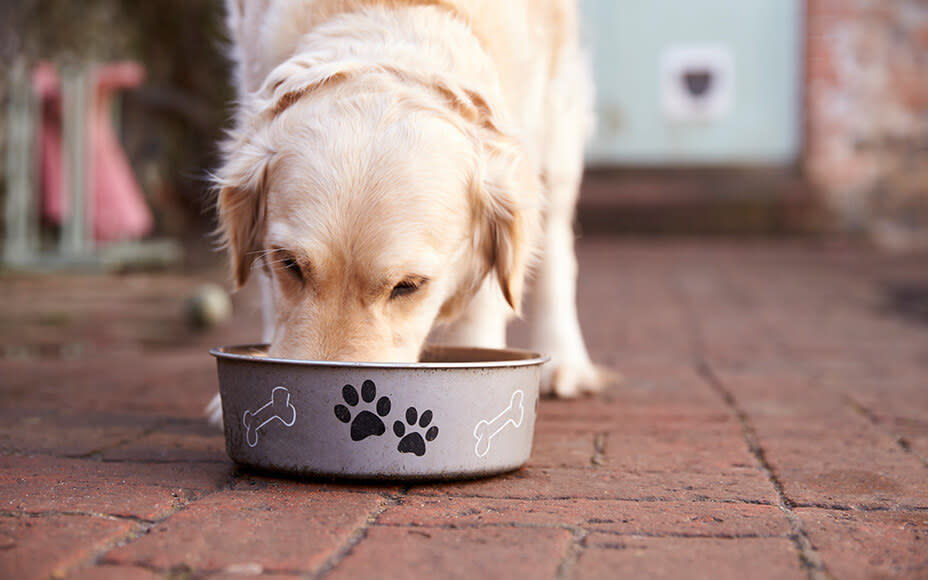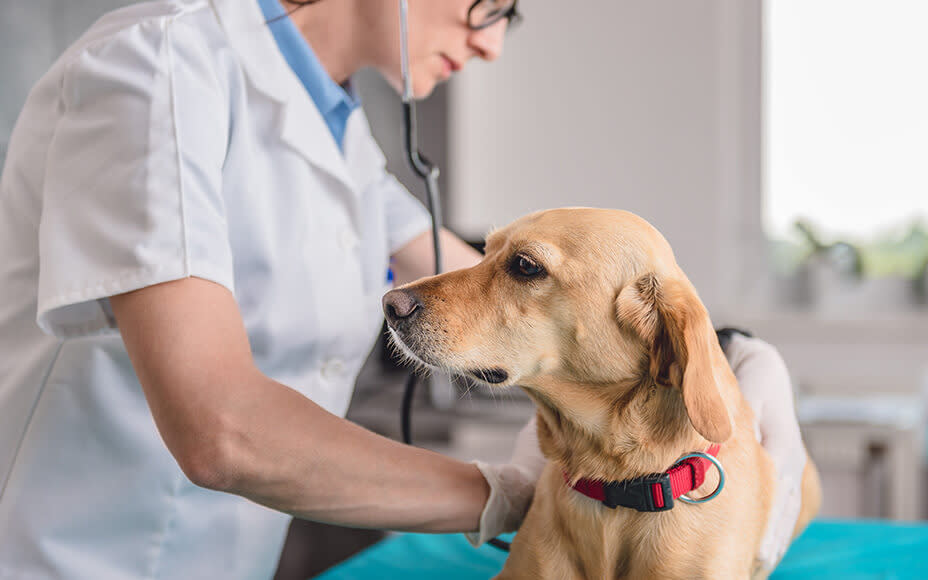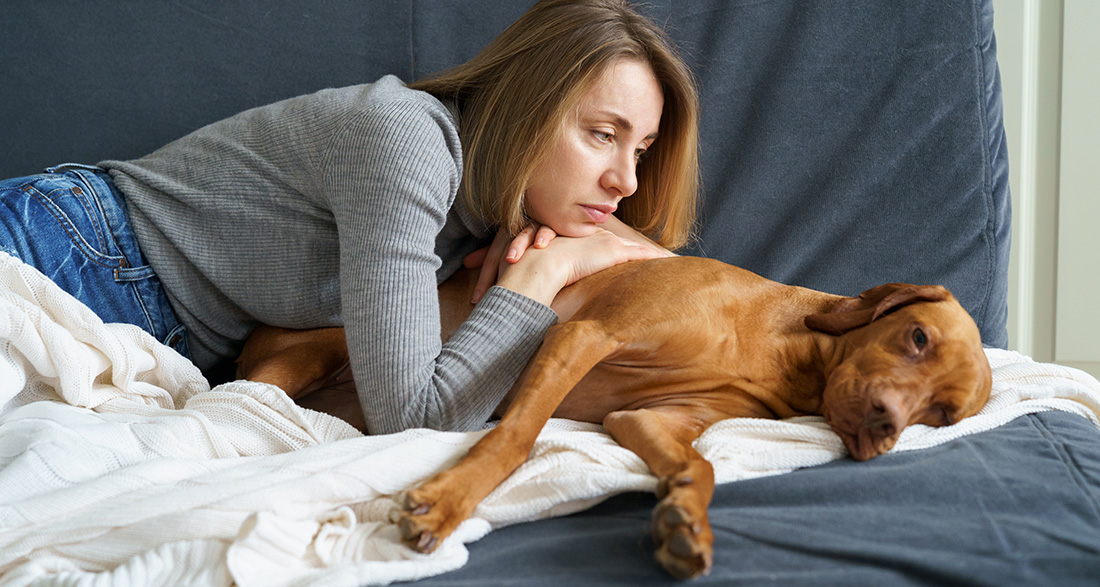Learn to recognize constipation in your dog early and explore available treatment methods.
Symptoms of Constipation: Recognizing Signs Early
Digestive problems and constipation can occur in dogs from time to time. However, if detected early, they can be effectively treated, and your furry friend will soon feel better. Fortunately, the initial signs of constipation are quite clear and easily recognizable. Look out for the following symptoms:
- Your dog passes little hard and dry stool, possibly with added mucus.
- Your dog attempts to defecate multiple times without success.
- Your dog excretes mucus and/or blood (known as pseudo-diarrhea).
- Additional symptoms may include loss of appetite, fatigue, bloating, abdominal tenderness, and occasional →vomiting.
But when is it time to visit the vet? A general rule of thumb is that a dog typically defecates one to two times a day on average. Sometimes, a minor case of constipation lasts only a day, and your dog may feel better after the next walk or the one after that. In such cases, you may not necessarily need to visit the vet. If in doubt, a call to a clinic can be a prudent step.

Common Causes of Constipation
There are various reasons for constipation, stemming from everyday habits, illnesses, or anatomical peculiarities of your dog. Sometimes, these causes can be interconnected.
The most frequent causes of constipation include:
- Incorrect nutrition
- Reduced intestinal motility, e.g., due to lack of exercise
- Intestinal obstruction
- Dehydration
- Medications, such as painkillers or antihistamines
- Metabolic disorders
- Pain in the rectal area
- Other serious conditions such as thyroid diseases or tumors
If your beloved pet consistently experiences digestive issues, a tailored diet based on your dog’s needs can be a straightforward solution. At iHugDogs, we’ve developed various dog food products for those with sensitive digestion. These aim to support a healthy gastrointestinal tract, maintain good stool consistency, and reduce digestive issues.
How to Help Your Dog with Acute Constipation
If you’ve noticed that your dog is struggling to defecate but is otherwise healthy, there’s no immediate need to rush to a clinic. Observe your dog for one or two days, and if the symptoms don’t improve, have your pet examined.
In the meantime, you can try to help your dog. However, always keep in mind: if you’re unsure, seek advice from veterinarians; sometimes, a simple call is sufficient. The most common home remedies for constipation in dogs include:
- Sufficient, calm walks: Ensure your dog has enough opportunities to defecate without time pressure. Exercise also stimulates bowel activity.
- Fresh drinking water: Make sure your dog has access to sufficient fresh water and encourage drinking.
- Fennel or chamomile tea: Instead of water, offer your dog cooled fennel or chamomile tea.
- Milk, psyllium husks: Natural, mildly laxative foods like milk or psyllium husks can help. Mix them in small amounts with your dog’s food.
- Flaxseeds, bran: They can help soften the stool in the intestines, making it easier to pass. Mix either flaxseeds or bran with water in a 1:10 ratio and add it to your dog’s food.
Additionally, certain fruits like apple, pear, apricot, or date, when grated or pureed, can act as natural laxatives. However, moderation is key.

When to Consult the Vet?
Remember, if you’re uncertain, you can always consult a veterinarian. However, it becomes crucial to visit the vet if your dog experiences pain during defecation, shows signs of loss of appetite, or vomits. If possible, collect a small stool sample from your furry friend and bring it along to the vet clinic.
Treatment at the Vet:
During your visit, you’ll likely be asked about your dog’s medical history and recent medications. A rectal examination may be conducted to identify any potential obstructions. If you’ve brought a stool sample, it may be analyzed for bone fragments, hair, or other foreign bodies. In some cases, a urine or blood test may also be necessary.
For mild and acute cases, a liquid or mushy diet along with digestive supplements may be prescribed. Sometimes, a lactulose solution is given as a laxative to ease your dog’s bowel movements. If the gut flora is compromised, additional support through a concurrent gut rehabilitation might be recommended.
For severe or chronic constipation, or if the stool is hard and dry with bone fragments, the vet may need to address the issue immediately. In such cases, the dog is given an infusion for fluid supply and an enema to soften and manually remove the stool. Subsequently, further treatment, as described earlier, may be necessary.

Preventing Constipation: What You Can Do
To prevent your dog from suffering from constipation again or avoid it altogether, you can take some simple preventive measures. The three most important factors are:
- A balanced diet,
- sufficient exercise, and
- access to fresh water.
It may sound simple, but it is! All three elements are essential for providing proper care for your dog, fostering a healthy gut flora, and ensuring good digestion. At iHugDogs, we strictly adhere to the principles of healthy dog nutrition. If you’re still looking for the right food or want to lay the foundation for a healthy life, we’ve got you covered.
If your dog is suffering from a chronic condition leading to an irreversible twisting of the intestinal walls (megacolon), allowing sufficient time for defecation is crucial. If medications cause constipation in your dog, these should be replaced or discontinued following consultation with a veterinarian.


